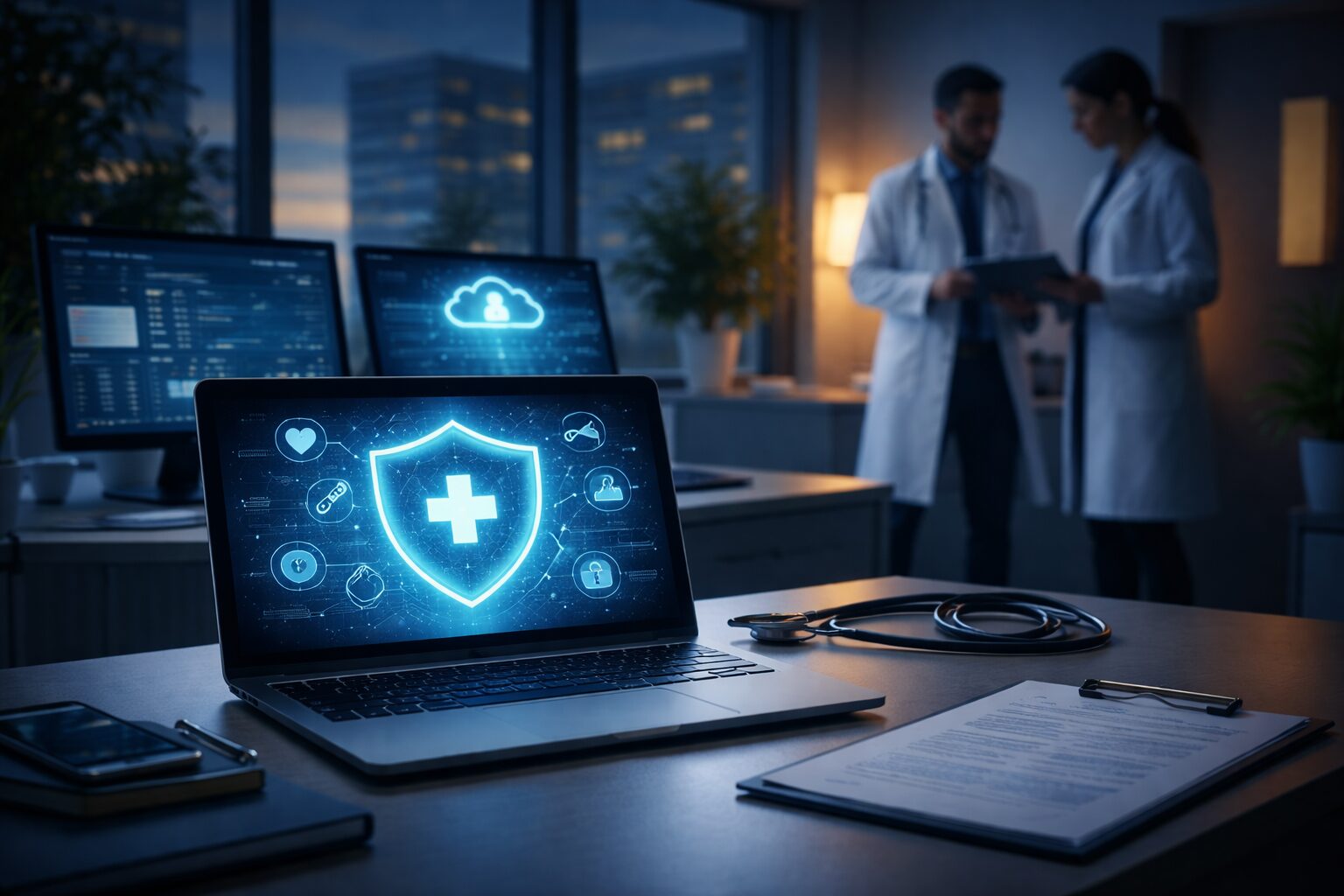Proper cyber hygiene in the healthcare industry is critical for HIPAA compliance and patient privacy. Failing to prioritize cybersecurity could lead to some significant consequences for your organization. This article will dissect the importance of cybersecurity in healthcare.
The Importance of Healthcare Cybersecurity
Maintaining high levels of security for your online information is critical to any business. However, in the healthcare industry, keeping patient information secure and confidential is even more important. The Health Insurance Portability and Accountability Act of 1996 (HIPAA) outlines the requirements for healthcare providers in protecting patient data and maintaining cybersecurity for all sensitive and confidential information. Understanding the importance of cybersecurity and information security in the healthcare industry can ensure that you stay on the right side of HIPAA regulations and maintain a safe and secure environment for patient information and medical records within your facility.
For healthcare organizations, implementing robust protections for sensitive data is essential to provide the best patient care and to prevent cybercriminals from accessing your sensitive information. Taking proactive steps to prevent data breaches to maintain adequate healthcare cybersecurity can allow you to avoid many common cyber threats and can allow you to stay in compliance with all federal, state, and local regulations regarding cybersecurity in the healthcare environment.
First, let’s start by answering some key questions unique to the healthcare industry.
What is HIPAA?
The Health Insurance Portability and Accountability Act is a set of standards for managing protected health information by healthcare organizations. These standards consist of two basic rules:
- The Privacy Rule outlines and defines the standards required of healthcare providers in handling and safeguarding patient information.
- The Security Rule specifically applies to the handling of electronic health records and the safeguards that must be put in place to protect this patient data during the creation of patient records, the transmission of records, or the storage of this data.
These standards and rules encompass a wide range of activities in the medical environment, including addressing vulnerabilities, preventing data breaches, and defending patient data from cyber threats. Each of these elements of HIPAA must be maintained to stay in compliance with federal regulations, making them some of the most important aspects of cybersecurity in healthcare.
What does HIPAA Require of Healthcare Providers?
HIPAA‘s Security Rule requires that healthcare facilities and providers institute measures to protect patient data that is recorded, transmitted, or stored under their oversight. This generally includes the following activities:
- Educating staff about best practices in securing patient data can reduce cybersecurity risks caused by phishing, social engineering, and failure to maintain adequate security for confidential and sensitive information.
- Controlling access to electronic health records and other sensitive information is also required under the provisions of the Health Insurance Portability Accountability Act. This includes physical security for record rooms and connected devices, as well as security measures designed to prevent unauthorized access to online records stored on servers or in the cloud.
- Establishing and maintaining strong security measures and endpoint protection will provide superior protection for patient information and allow your organization to stay in compliance with all applicable regulations and laws pertaining to data security.
- Performing reviews of existing security measures and upgrading them as needed can help you take on today’s challenges while preparing proactively for the cybersecurity risks and threats on the horizon.
- Working with a company that specializes in information security for healthcare organizations can help you manage cyber threats more effectively. Security professionals with experience in the healthcare industry can provide you with the best protection against malware, ransomware attacks, data breaches, and many other cybercrimes. This can ensure full compliance with all HIPAA regulations and requirements now and in the future.
Making sure your healthcare organization remains in full compliance with all applicable regulations and requirements can provide your patients with greater peace of mind and can reduce the risk of healthcare data breaches that could affect your reputation and the financial stability of your operations. Healthcare data is a popular target for cybercrime and can be used to gain further access to financial or personal records if a data breach occurs. Knowing the risks and pain points for securing sensitive information can help your facility protect itself from these serious threats to your organization.
WHY IS THE HEALTHCARE INDUSTRY SO HEAVILY TARGETED BY CYBERCRIMINALS?
The healthcare industry‘s rapid digitization and extensive reliance on the Internet of Things (IoT) have positioned it as a prime target for cybercrime. As patient data, sensitive medical records, and critical infrastructure become increasingly digitized and interconnected, they create an appealing landscape for cybercriminals seeking to exploit vulnerabilities. The high value of personal health information on the black market, coupled with the often inadequate cybersecurity measures, underscores the industry’s susceptibility to attacks. This convergence of valuable data, technological complexity, and security gaps has propelled the healthcare sector to the forefront of cybercriminal interest, highlighting the urgent need for robust cybersecurity strategies to safeguard patient privacy and ensure the integrity of medical services.
Here are some of the key reasons why malicious actors so aggressively target the healthcare industry:
Valuable Data: Healthcare organizations store a vast amount of valuable data, including personal and financial information, medical histories, insurance details, and more. Valuable data is highly sought after by cybercriminals for identity theft, financial fraud, and other malicious purposes.
Lack of Cybersecurity Preparedness: Many healthcare institutions historically have lagged behind in terms of cybersecurity investments and practices. Limited resources and complex, legacy systems can make it challenging to implement robust cybersecurity measures.
Complex Ecosystem: The healthcare industry has a complex ecosystem involving hospitals, clinics, insurance providers, pharmaceutical companies, and more. This complexity can create vulnerabilities at various touchpoints within the system.
Human Factors: Healthcare employees often handle sensitive information and may be targeted through phishing emails or social engineering. Human error, such as inadvertently clicking on a malicious link, can lead to security breaches.
Ransomware: Ransomware attacks have become a major threat to healthcare organizations. Attackers encrypt the organization’s data and demand a ransom for its release. Healthcare providers may be more likely to pay the ransom due to the critical nature of patient care and the urgency to restore services.
Regulatory Environment: Healthcare is subject to strict regulatory frameworks, like HIPAA as mentioned above. Meeting these regulations can be challenging, and non-compliance may result in significant penalties.
Monetary Gain: Stolen medical records and sensitive data can be sold on the dark web for substantial sums of money. Additionally, the disruption caused by cyberattacks can lead to financial losses, making healthcare a profitable target for cybercriminals.
Critical Infrastructure: Healthcare systems are essential to public health and safety. Disruption of medical services can have dire consequences, and attackers may exploit this vulnerability to extort organizations or governments.
Legacy Systems: Healthcare organizations often use outdated software and technology due to budget constraints and compatibility issues. These legacy systems may have known vulnerabilities that can be exploited by cybercriminals.
IDENTIFYING THE TOP FIVE CYBERSECURITY THREATS TO HEALTHCARE PATIENTS’ PRIVACY
Addressing vulnerabilities in the cybersecurity of healthcare facilities is one of the most important steps in maintaining compliance with federal regulations regarding electronic health records and patient data. According to the U.S. Department of Health and Human Services, the top five threats impacting healthcare providers in the security field are:
- Phishing attacks and social engineering: Many data breaches occur because of errors made by staff members who inadvertently provide the means of access to cybercriminals.
- Ransomware attacks: Ransomware is a form of malware that locks up critical processes on individual computers, networks, or servers.
- Loss or theft of computer systems: Laptops, computer systems, and other devices that contain or have access to electronic health records or other protected health information (PHI) must be protected against unauthorized access and physical theft.
- Accidental or deliberate data loss: Accidental data loss can happen when an inexperienced colleague deletes information inadvertently or in an uncontrolled way.
- Attacks by hackers on medical networks and devices: DDoS attacks occur when a user or multiple users flood your server with incoming traffic to prevent patients from accessing it.
Failing to protect your organization and patient data from these five major threats could put you on the wrong side of federal regulations. Working with a firm that specializes in healthcare cybersecurity is often the most practical way to manage all aspects of implementing and maintaining security for electronic health records and other confidential data.
CHALLENGES OF MANAGING HEALTHCARE SECURITY
IT professionals face unique challenges in the healthcare industry. The nature of the information contained in EHRs creates added pressure to maintain absolute security for these electronic medical records. Additionally, healthcare providers must balance competing interests and priorities to provide the highest level of patient care:
- Confidentiality is the most important element of maintaining security in the healthcare environment. Making sure that patient information is protected from unauthorized access and that all the operating systems on which this data resides are properly defended from cybersecurity threats is essential in the healthcare industry.
- Accessibility for patients, physicians, and other healthcare workers is also a primary concern in this industry. Balancing the need for rapid access to vital health information while preventing unauthorized individuals from accessing this confidential data requires experience and skill. Records that take too long to load could affect patient care and could even cost lives. Making sure that electronic health records are immediately accessible is essential.
- Integrity refers to the accuracy, consistency, and completeness of the data you manage. Backups and upgrades for server systems are among the most commonly used ways to ensure data integrity and prevent unexpected data losses that could cost you time and money to resolve and could negatively affect your organization’s reputation.
- Budgetary constraints often create limitations for IT professionals in the healthcare industry. This can sometimes lead to data loss or exposure to cybersecurity risks that could jeopardize patient medical records and protected health information. Underplaying the importance of cybersecurity and failing to fund proper measures can put healthcare providers at risk from various cybersecurity threats.
- Legacy systems can pose serious issues for healthcare workers and IT professionals who must incorporate these out-of-date software packages into their security planning processes. However, finding ways to upgrade systems to more modern and secure options can be challenging. Working with a company specializing in information and data security in the healthcare arena can often provide your organization with options allowing you to sunset these systems while protecting your workflows and patient safety.
- Proactive risk management can often be overlooked as overwhelmed IT teams deal with daily challenges and requests. This can allow vulnerabilities to go unaddressed and increase cybersecurity risks for your organization.
- Ongoing connectivity is generally necessary to allow physicians, nurses, and patients to access the information they need to manage health issues effectively. Ensuring that health records are easily accessible for those with authorization while maintaining a defensive security posture to prevent unauthorized access is a balancing act best left to experienced cybersecurity professionals.
For many healthcare organizations, outsourcing security to a team with proven experience in managing HIPAA requirements and providing real protection against cyber threats can be a cost-effective solution to these issues. Meriplex has a suite of solutions that can be customized to suit the needs of your healthcare facility. We are here to help you maintain the best protection for your confidential information and to provide proactive risk management for your organization now and in the future.
WHAT TO LOOK FOR IN YOUR HEALTHCARE CYBERSECURITY PARTNER
When choosing a partner to assist you in compliance with HIPAA requirements, you should look for a few key attributes that will ensure the best results for you and for your patients:
- Experience with federal requirements: Compliance with all applicable federal regulations governing the use, transmission and storage of sensitive data is a must for your organization.
- Up-to-date knowledge of vulnerabilities: Your partner in protecting the data contained in electronic health records should stay current with the latest cyber threats to provide you with effective and proactive solutions for these issues.
- Cloud computing services: As more services and data storage solutions move to the cloud, your organization will need a partner that can handle the new challenges and data protection requirements of this online environment. Learn more about how cloud computing in healthcare works from the Meriplex blog.
- Networking capabilities: Transmitting and storing patient information securely is essential to prevent data breaches and unauthorized access to protected health information.
At Meriplex, our team can provide you with the solutions you need to manage all your compliance activities effectively. We have extensive experience in providing customized solutions for healthcare organizations and can design a cybersecurity program that covers all the key requirements of federal regulations regarding protected health information. If you are looking for the best options for managing protected patient information in the healthcare environment, contact Meriplex today. We are here to help you stay on the right side of federal regulations and to protect patient data effectively in the modern medical environment.



